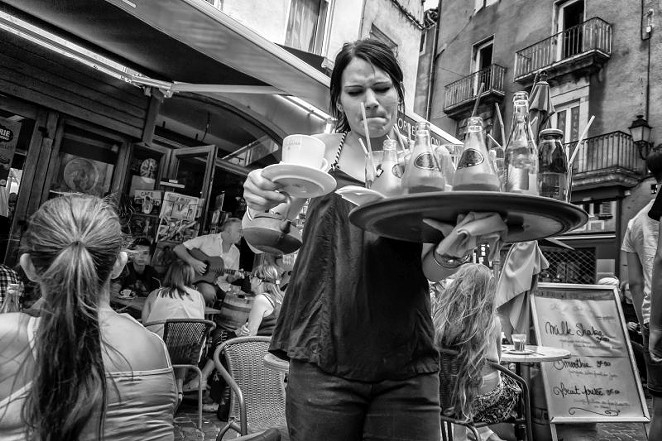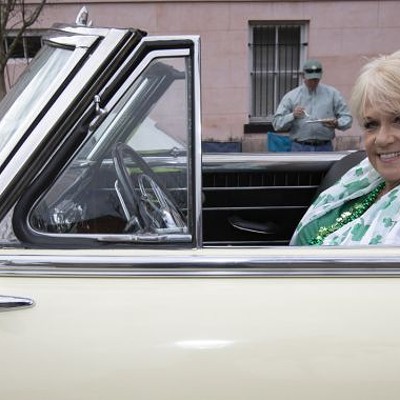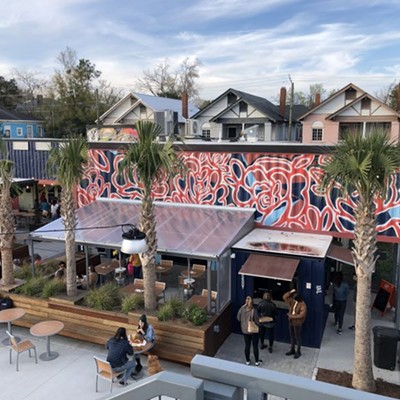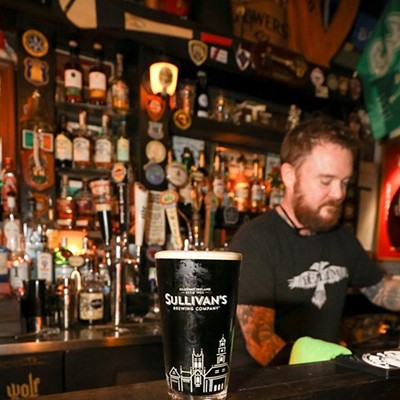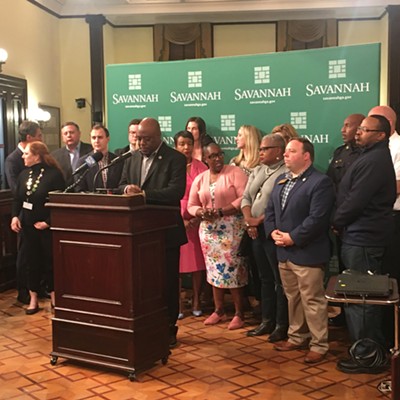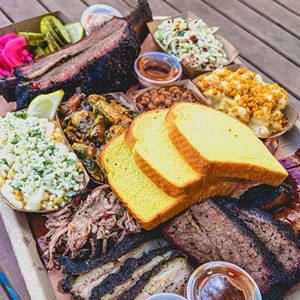THERE ARE so many people who make St. Patrick’s Day a reality for thousands of revelers.
For every beer you drink, a bartender pours it, and a bar manager stocked it, and a bar owner paid for it.
For every slice of pizza you eat to sober up, a server sold it to you, and a cook made it, and a kitchen manager ordered the ingredients.
Musicians work doubly hard on a grueling weekend to provide the soundtrack to your party.
Pedicab drivers ride all over the city to keep you from walking or, worse, driving.
The list is longer than many people outside the service industry can fathom.
Pulling off an event like St. Patrick’s Day is no small feat. Trina Brown, who owns the Rail Pub, starts stocking up in February. Jeff Shaffer, who plays with local band Squash, can ask up to a quarter more than he’d usually charge for a bar gig.
When Marvin Johnson rode for Savannah Pedicab, he’d ride from one side of the city to the other multiple times a day. Bartenders, like Anita Narcisse at Club One, end up pulling incredibly long shifts, sometimes over twelve hours, with few breaks.
“It’s about being as fast as possible, because it doesn’t stop. It just doesn’t,” says Narcisse. “You just go in knowing you’re going to get your ass handed to you all day long.”
This is the service industry’s Christmas. It’s the weekend that hundreds of employees rely on to pay their rent a few months ahead, make a down payment on a car, or start a rainy day fund that isn’t always a given for this workforce.
Savannah’s service industry workers rely on tourism, but it’s clear through certain actions that the City of Savannah prioritizes just about anything over the people who help drive their own economy.
The St. Patrick’s Day festival has grown to such epic proportions that simply being able to buy beer in a bar is not an option anymore, at least not in the City’s eyes. In the years since the dreaded wristband rule, the City has also allowed organizations to sell beer out of their own coolers.
“In addition to wristbands being required in the upper City Market area, the City authorized nonprofits to have beer tents on city squares, on city property,” says Brown.
“So no one can sell beer or alcohol on City property unless they’re a nonprofit, and now we have a special event permit. It seems contradictory, because you have a city that says, ‘We don’t want a street party,’ but yet they’re authorizing vendors to sell beer on the city streets.”
Predictably, this is not beneficial for brick-and-mortar businesses, who follow a different set of standards than someone holding a special event permit.
“A lot of us have said it’s not worthwhile for us to sell ‘cheapest beer,’” says Brown. “There’s a balance between finding the right price point that serves the customer and allows us to pay our overhead and our bills, and a lot of these tents undercut what the average markup price.”
Consider that for St. Patrick’s Day, the volume is so staggeringly high that businesses staff more people than usual to fit the demand.
The Rail begins hiring and training people in January, and on the weekend itself, Brown pays her employees a higher hourly rate to ensure that people will show up and make it through the weekend.
So if a nonprofit tent pops up in Franklin Square that sells beer for two bucks, the Rail can’t keep up with that competition.
On festival days, businesses don’t just see customers—they get regular checkups from the police, the fire marshal, the health department, and the Alcoholic Beverage Compliance unit checking to make sure everything is above board.
Brown tells of a situation last year when a bartender was pulled from behind the bar and lectured because a customer was vaping. The City employee threatened to write up the bar, which would result in fines and the possible revocation of the Rail’s license to sell alcoholic beverages.
“With the businesses that have an all-year license, if we make a mistake, it’s held on our permanent record,” says Brown. “These beer tents and these nonprofits, if they make a mistake, it’s forgotten about by next year when they stroll up again.”
Speaking of fines, Johnson faced the same issue when he rode for Savannah Pedicab. When he first started the job, Drayton Street was open to foot traffic.
“Pedicabs were encouraged to use Drayton and Whitaker to get up and down, from one side of the city to the other,” remembers Johnson, “and the way they do the parade route, it’s impossible to cross from east to west, so that was really our main highway.”
Then, one year, the City changed its policy and didn’t let bikes on Drayton Street.
“They set up road blocks so we had to go certain ways, and then they were waiting at the end of those paths to write us tickets,” says Johnson. “And Pedicab tickets are $200, so for a lot of people, that’s the end of the game right there.”
Johnson also remembers miscommunication between the police and receiving contradictory statements from different officers, leading to needlessly long rides and fines that spoiled the day.
“The City of Savannah expanded on behalf of the tourists and didn’t really think about the businesses that tourists rely on to have a good experience,” says Johnson.
“Tourism is definitely the money-making industry, but at the same time, when you’re doing so much for the tourists but undermining the locals and the people that live here, at what point are you going to drive out the work force and the people?”
A common refrain with locals is that tourists come to Savannah and can do basically whatever they want. Why would they expect any different when the City prioritizes them over the people who actually live here?
Narcisse sees that attitude in the customers who aren’t Club One regulars.
“Club One is already a destination location; it’s definitely a gay club,” says Narcisse. “We usually get a mixed crowd, but on St. Patrick’s Day, it’s just an inundation of people who are not gay in the gay bar. It’s almost the only time of year I don’t feel as safe as I usually do bartending. I think the most wild thing about St. Patrick’s Day is that people just get drunk and treat it like a situation where they can do whatever they want to. That’s the part that’s the most difficult to handle.”
Johnson agrees. “The biggest problem with St. Patrick’s Day as a whole from the customer perspective is a lot of people take it as the day where it is acceptable to be belligerently drunk,” he says.
“There are certain things you might not do on any other day, like drop-kicking a cop or leaving all your trash in the streets, dumb shit like that.”
It’s worth mentioning that last year, between Mar. 14- 17, the Chatham County Sheriff’s Office made 260 arrests, while there were only 81 arrests made over April 26-28, Orange Crush weekend on Tybee.
Orange Crush is a hotly-contested spring break event comprised mostly of Savannah State students. Every year, locals want to shut down the event because of concerns over trash left from the festivities and the presumed danger.
Still, the arrests for St. Patrick’s Day weekend are three times higher than the arrests for the weekend of Orange Crush, which also included the Tybee Island Wine Festival.
To be clear, none of the people I interviewed felt that tourists were the problem. Each expressed gratitude for the tourism industry, which drives their revenue and helps them pay their various bills. They all agree that the problem lies elsewhere.
For Brown, it’s the wristbands required for the festival zone.
“In the last five to 10 years, there was a big push from the Waterfront Association to have wristbands past River Street up in the City Market area, because not all people wanted to go to River Street and not all people wanted to pay for a wristband,” says Brown.
“The Waterfront Association [now renamed Savannah’s Waterfront] created that environment and the entertainment zone, and when people started deciding to spend money elsewhere, all of a sudden the City allowed for the expansion of the wristband because they didn’t want to shoot themselves in the foot.”
Brown also brings up the issuance of catering licenses to businesses set up on the river, which takes business away from the other restaurants that already exist.
“Let’s just say this—if they authorize [local] businesses to manage a catering tent, they’d be putting money back into businesses that are here 12 months out of the year, provide jobs throughout the year, paying taxes throughout the year,” she says.
For his purposes, Shaffer finds Savannah’s Waterfront easy to work with.
“This is our third year working with Savannah’s Waterfront with their themed celebrations, and they’re super accommodating, always really nice,” he says.
“Yes, it’s frustrating to navigate some of the obstacles put in place, but at the same time, it’s much more beneficial. We’re seeing probably, I’d say, a 300% increase in stages both on the river plus on the daily clubs—the city is just flooded with people trying to be here.”
The obstacles Shaffer’s referring to is the gridlock of the city, particularly restricting for a performer. Last year, Squash played on the river and had their next set at City Market, and since there was no way to move their car into the festival zone for load-in, they had to lug their equipment on handcarts to the next set.
Shaffer’s grateful for the tourists that listen to his music and buy their merch, but he recognizes the huge influx of people coming to the city. It’s this influx that the hotel developers are jumping on.
“Savannah has some great events going on, but are you really telling me that 11 months out of the year that these 22 hotels in a six-block radius are packed to capacity?” asks Johnson.
All told, the hotels and the packed streets and the green beer and the tourists and all the things that St. Patrick’s Day in Savannah has come to embody are just a scapegoat for the fact that the City is not prioritizing the people that support its economic growth.
“I think sometimes the word ‘tourism’ is inappropriately used as a bad word, and it’s a distracting phrase that divides us,” says Brown.
“Because what it really boils down to is, if the City could support the people that live here, that work here, that build businesses here and could get in alignment with us, then maybe those beer tents would have less of a negative impact.”

